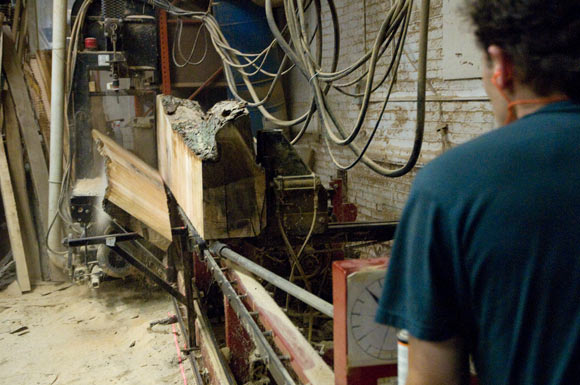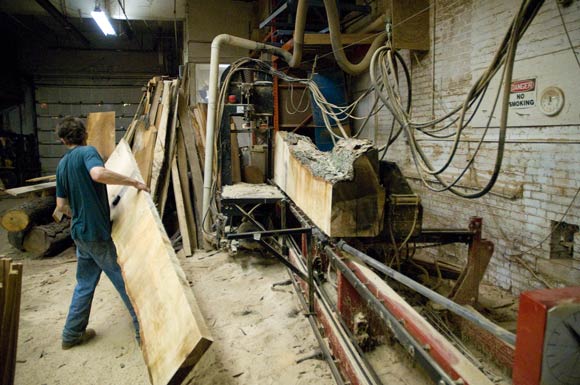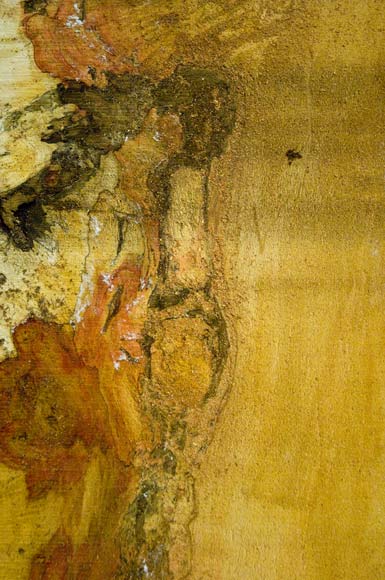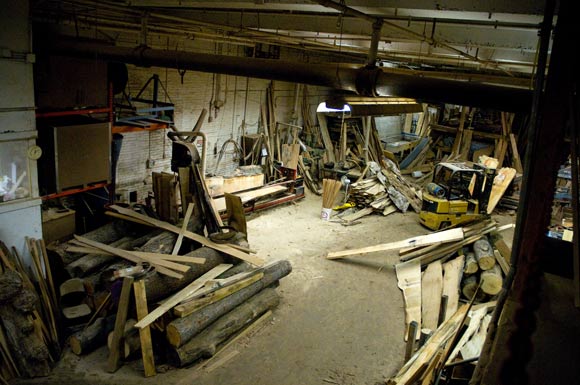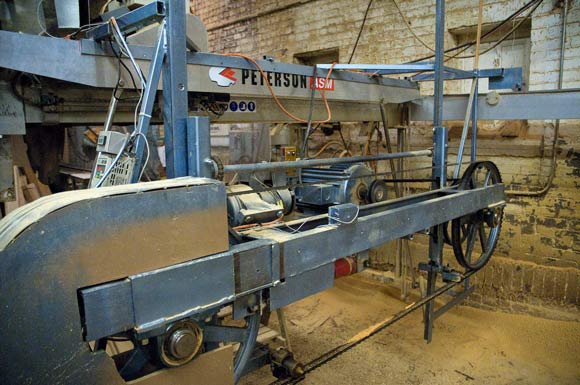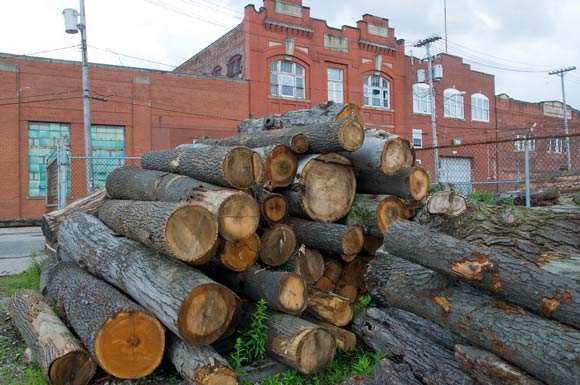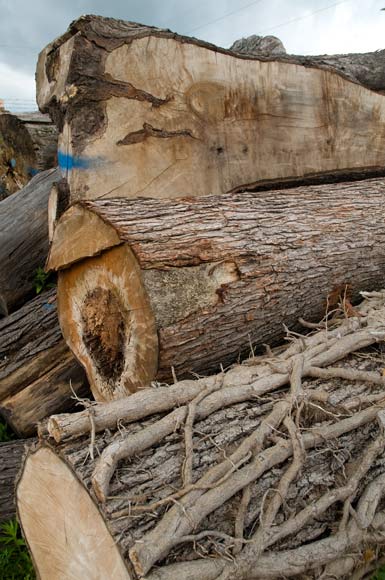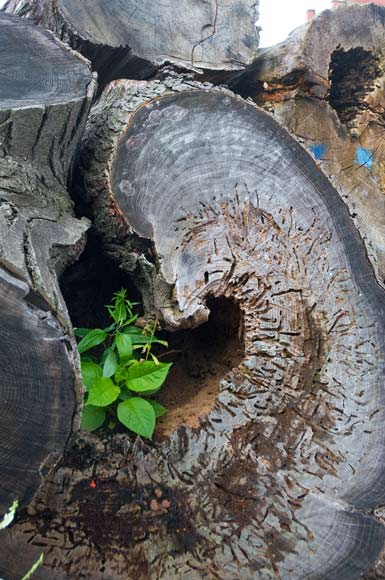treehugger: dean heidelberg's urban sawmill saves fallen trees from mulch pile
When a tree falls in the city of Cleveland, it gets trucked off to a facility that reduces it to mulch, which is then dyed an offensive shade of red or black and ultimately laid to rest on somebody's prized flower bed. It is a crime not only upon nature, but to Dean Heidelberg, owner of Metro Hardwoods.
"It takes a lifetime for one of these trees to grow that size," says Heidelberg, pointing to a particularly massive specimen. "Top-grade timber is getting chopped into mulch or burned for fuel and meanwhile, people are buying furniture made from cheap particle board."
It's a sad reflection on today's society, he adds, whereby shoppers "want it now and want it cheap."
As the operator of one of this country's only urban sawmills, Heidelberg is on a mission to rescue as many trees as possible. Outside his Stockyards-based mill is an acre of fallen trees, salvaged from all over Northeast Ohio and stacked into unyielding pyramids. Heidelberg reckons there's a million-and-a-half pounds of lumber out there, just waiting to be reduced to useable timber. Each trunk weighs as much as two automobiles, requiring a heavy-duty forklift to even budge them.
Located just a mile from the shops and restaurants in Gordon Square, Metro Hardwoods is a 14-year-old business that few people know or even care about. But for those who do, it is one of the best and only sources for quality hardwood, harvested from century-old sycamores, oaks, elms, sugar maples and black walnuts. Some are cut down by tree companies or felled by an errant lightning strike; others simply fall over from age or waterlogged roots.
Bucking current fads, Heidelberg doesn't whittle his logs down into precious little cutting boards, or shape them into burled knife handles. Most often he just slices them like cheese into colossal slabs, a meaty four inches thick by four feet wide by eight feet long. Primitive, rustic and often sporting a natural -- or "live" -- edge, the slabs often end up as impressive dining room tables, coffee tables, or sideboards -- conversation pieces, folks call them. Sawed into narrower planks, the wood is a natural for benches, stair treads, or woodsy fireplace mantels. Taken down even further, the boards end up in the hands of fine furniture makers.
Visitors to Market Garden Brewery in Ohio City and Battery Park Wine Bar in Edgewater, among other places, can see the fruits of Heidelberg's labors. The communal tables in the beer garden of the former and the weighty bartop in the latter all hail from Metro Hardwoods.
Working alone in a roomful of gruesome equipment, Heidelberg endures 100-hour weeks to convert that pile of trees out front into useable lumber and sawdust, which gets carted off in massive bins to horse stables. He says he's got about $400,000 in equipment at the shop, a 10,000-square-foot complex that long ago housed Standard Brewing, producer of Erin Brew. Now, instead of beer, the room smells of bourbon, likely from the saw-cut oak and sawdust that covers every square inch of space.
Off to one side of the cavernous room, a saw equipped with a 17-foot circular metal blade moves horizontally through the trunk of an ancient hardwood. When Heidelberg hears the tell-tale sound of metal on metal, he reaches for his metal detector and invariably discovers an old bolt or turnbuckle, twisted into the tree a generation ago to support a clothesline or rope swing. The best way to get it out, he notes, is to excise it with a chainsaw.
Heidelberg says the fun part is cutting into on old trunk for the first time to reveal what's inside -- not unlike digging deep into a freshly opened box of Cracker Jack.
"It's nice to open up a log and find interesting patterns," he explains, pointing out in a nearby slab prized "flaws" such as a gnarled grain or burled hue. "You don't find a lot of that in trees from the country that grow straighter and have more generic grains. Grown under the stress of city conditions is where you get the character."
Word of mouth is how folks find out about Metro, says Heidelberg, who started his company at the age of 23. Lately, word seems to be spreading faster than he can keep up. Running counter to our race to the bottom in terms of fast, cheap and temporary products is a growing trend toward local, sustainable and handmade stuff. Heidelberg's locally-harvested timber fits the bill.
"When I first started doing this, nobody cared where the wood was coming from," he says. "Now, everybody wants to know." He appeases them whenever he can, citing the cemetery, park or notable public building near which the tree lived its life. One tree -- he calls them "Omen trees" -- killed a boy on its way back down to Earth.
Heidelberg went to school for forestry, but decided that a solitary life spent scaling trees in the middle of nowhere sounded less than appealing. It was while building electric guitars by hand that he discovered the lack of sources for quality wood. "I wanted to be an industrialist, to work with something in a sustainable way in a niche that wasn't being covered," he explains. "I was the first to do an urban sawmill in a major American city."
Rather than jump from special order to special order, Heidelberg lately has been on a mission to get ahead, to build enough inventory to stock a showroom he's putting together. Customers would rather buy what's here and ready, he says, than have to wait a week for an unknown custom product.
"I'm hoping to get caught up this year," he says, grinding a two-inch centipede into the ground. "But I've been doing this for 15 years and haven't gotten caught up yet."
With sawdust in his hair and earplugs around his neck, Heidelberg gets back to his Sisyphean task of reducing an acre of fallen trees into planks, boards, slabs and slats. After all, he'd much rather see a tree become a prized family heirloom than end up as a pile of garish red mulch smothering a pack of posies.


